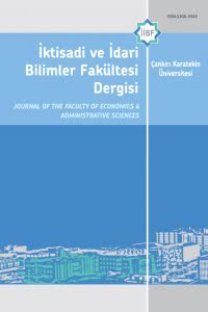Nijerya’da Yoksullukla Mücadele Programı’na (NAPEP) İlişkin Bir Değerlendirme
An Assessment of Poverty Eradication Programme (NAPEP) in Nigeria
Extreme Poverty, Eradication, Unemployment, Empowerment, Development Programme.,
- ISSN: 1308-5549
- Yayın Aralığı: 4
- Başlangıç: 2011
- Yayıncı: Çankırı Karatekin Üniversitesi
Arap Baharındaki Küresel Siyasi Olayların Hisse Getirileri Üzerindeki Etkisi: Türkiye Örneği
İbrahim BOZKURT, Muhammed Veysel KAYA
Azerbaycan Bankacılık Sisteminde Karların Sürekliliği
K. Batu TUNAY, Shahriyar MUKHTAROV
İki Bankanın Farklı Şubelerindeki Müşteri Bekleme Sürelerinin Kuyruk Modeliyle Etkinlik Analizi
İrfan ERTUĞRUL, Burcu BİRSEN, Abdullah ÖZÇİL
Avrupa’da Merkantilist Uygulamalar ve Osmanlı Ekonomisi İle Bir Karşılaştırma
Vietnam Turizm Sektöründe Reklam Stratejilerinin Bulanık Kural Tabanlı Analizi
Nguyen Quang VINH, Dam Van KHANH, Nguyen Viet ANH
Kanepe Montaj Hattının Dengelenmesi ve Benzetim Yöntemi İle Sınanması
Mesleki Özyeterlilik ve Örgütsel Sessizlik İlişkisini Belirlemeye Yönelik Ampirik Bir Çalışma
Tüketici Temelli Marka Değerinin Marka Tercihlerine Etkisinde Ailenin Aracılık Rolü
Yerel E-Katılımın Yeni Aracı Olarak Sosyal Ağlar: Facebook ve Twitter Örneği
Fuzzy rule- based analysis of promotional efficiency in Vietnam's tourism industry
